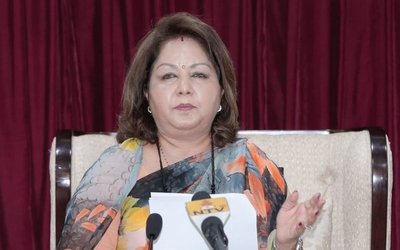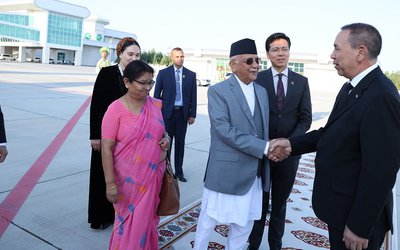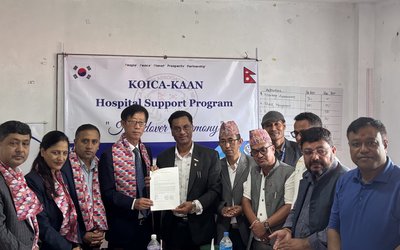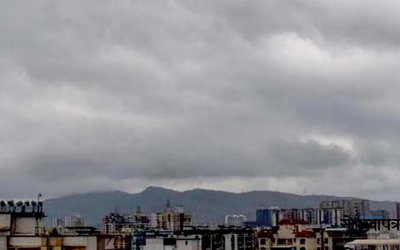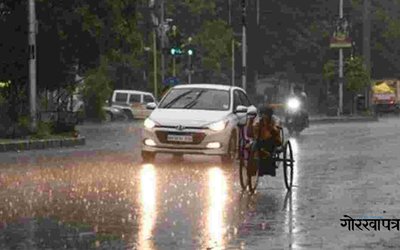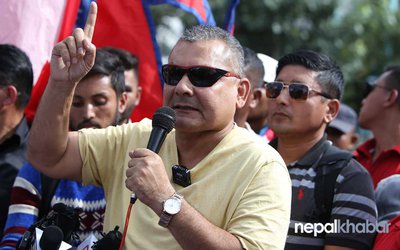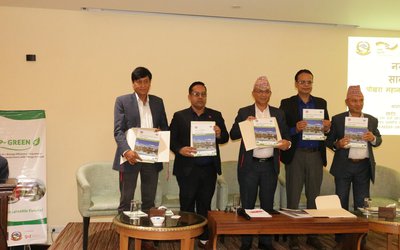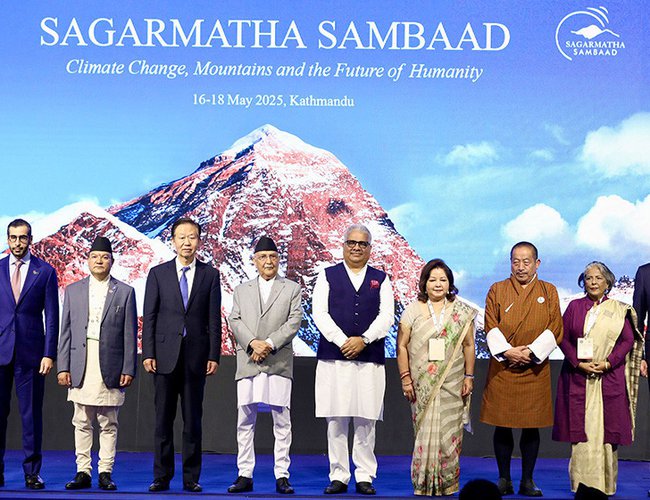
Inaugurated by Prime Minister KP Sharma Oli with a grand speech, Sagarmatha Sambad concluded by issuing a modest 22-point declaration. The event was attended by high-level experts, representatives from various international organizations, ministers from friendly countries, and senior leaders from China and India.
Discussions at the Sambad focused on climate-related issues such as funding challenges, loss and damage, and promoting a green economy. During the event, Xiao Jie, Vice Chairman of the Standing Committee of the National People’s Congress of China, repeatedly used the Chinese name "Chomolungma" for Mount Everest, despite the official Nepali name being Sagarmatha.
This has sparked discussions in diplomatic and public circles, overshadowing the international climate dialogue at the event.
The event, named after the Nepali name for Everest, Sagarmatha, aimed to emphasize Nepal's responsibility for the world's tallest peak.
Despite the event's official title, Xiao, who gave the keynote address in Chinese (translated live into English), used the term "Chomolungma" at the China tries to rebrand Mount Everest at Nepal Summit. However, other dignitaries and attendees consistently referred to the mountain as Sagarmatha or Mount Everest. Among those present at the session were Nepal's Prime Minister KP Sharma Oli, Foreign Minister Arzu Rana Deuba, and Finance Minister Bishnu Paudel, among others. However, none of the senior officials publicly commented on the use of the Chinese term during the high-level opening ceremony.
This incident occurred shortly after PM Oli publicly urged the global community to recognize the mountain by its Nepali name, Sagarmatha, rather than foreign or alternative names.
The three-day Sagarmatha Sambaad, held in Kathmandu, is being attended by over 200 participants from around the world, including representatives from Bangladesh, Bhutan, India, Japan, Qatar, Pakistan, the UK, and the UAE, as well as major international organizations such as the United Nations, World Bank, ADB, SAARC, BIMSTEC, and ICIMOD.
The highest peak in the world is known as Mt Everest to the rest of the world. In Nepal, where its southern part rises along the northern border, it is called Sagarmatha. In Tibet, where its northern part stands along the southern border, it is known as Jomolangma.
During the conference, Chinese Vice Chairman referred to it as Chomolongma Sambad, which was noted by many participants. Former Nepali diplomats believe that naming the conference Sagarmatha, a border mountain between Nepal and China, was a diplomatically incorrect choice. A senior diplomat, speaking anonymously, mentioned that China's use of the name sends a message to Nepali political leadership about respecting borders.
The dialogue, titled "Dialogue for Himalayas," was focused on climate change, the Himalayas, and the future of humanity. Minister for Foreign Affairs Dr. Arzu Rana Deuba highlighted the extensive discussions on climate change and its challenges facilitated by the Sagarmatha Sambaad.
The conference, originally announced several years ago, was delayed due to the COVID-19 pandemic and frequent changes in the government.
Our individual efforts are not enough to address this common problem. That is why Nepal has initiated the Sagarmatha Dialogue to create a shared platform for collective cooperation and coordination. This forum is inclusive for all," stated Minister Dr. Rana. Highlighting recent instances of climate-related natural disasters in Nepal, such as increasing temperatures, unpredictable rainfall, flooding, glacial lake outburst floods, droughts, and wildfires, she emphasized the regional nature of these challenges and the importance of addressing them through this event.
During the grand opening session of the inaugural Sagarmatha Sambaad, organized by the Government of Nepal for the first time, Prime Minister Oli expressed that the dialogue emerged from a strong sense of mutual dependence.
Prime Minister Oli remarked, “Our communities are being devastated by landslides. Floods and droughts occur unexpectedly. Nevertheless, we remain resilient. While our emissions are low, our efforts towards environmental conservation are significant.”
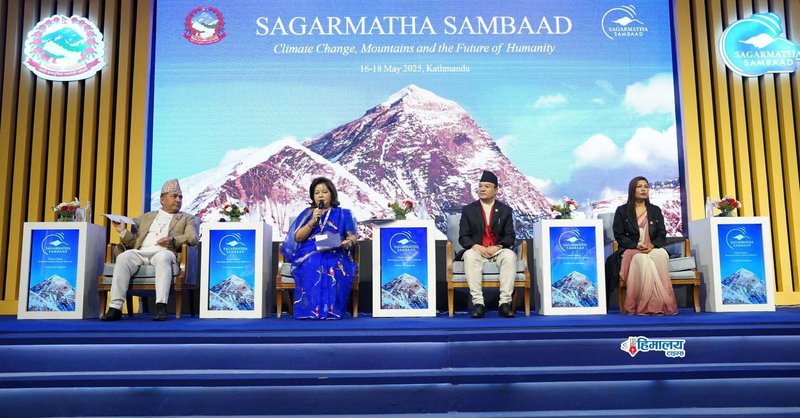
Minister for Foreign Affairs Dr. Arzu Rana Deuba stated that the Sagarmatha Sambaad has effectively raised awareness about climate change issues, spanning from mountain regions to islands.
Speaking at the closing session of the Sambaad, she emphasized that this edition of the Sagarmatha Sambaad successfully united leaders, policymakers, experts, scholars, youth, civil society, international organizations, and community members from high mountains to island nations in a meaningful dialogue.
The Foreign Minister announced that the next edition of the Sagarmatha Sambaad is scheduled for 2027. The three-day event, which took place in Kathmandu from May 16 to 18, 2025, focused on the theme "Climate Change, Mountains, and the Future of Humanity."
The full text of the Sagarmatha Call for Action
- Reaffirm the urgency to hold the increase in the global average temperature to 1.5°C above pre-industrial levels by accelerating mitigation actions, building adaptive capacity and resilience, addressing loss and damage, and strengthening partnerships to ensure a sustainable future for all.
- Encourage countries to set ambitious emissions reduction targets in their Nationally Determined Contributions (NDCs) 3.0 to keep 1.5°C alive, aligned with the latest science that calls for urgent and transformative global action.
- Further encourage countries to develop and implement National Adaptation Plans to respond to country – specific adaptation needs.
- Call for enhanced provision and mobilization of international financial support, particularly through grants and concessional financing for implementation of climate actions in developing countries, including countries in special situations.
- Encourage collective efforts to ensure equitable and simplified access for the developing countries, particularly those vulnerable to climate change, to the international climate finance from bilateral, multilateral and alternative sources, including the operating entities of the Financial Mechanisms and the Funds under the UNFCCC and the Paris Agreement.
- Support the call for the establishment of a dedicated fund for the development of mountain countries to mobilize targeted financial resources for climate action and sustainable development in mountainous regions.
- Prioritize the recognition, respect, and rewarding of mountain ecosystem services through leveraging existing and innovative financing sources.
- Emphasize the role of private sector finance and carbon markets in scaling up sustainable climate actions.
- Strengthen global and regional partnerships to facilitate access to climate-friendly technologies and enhance capacity building.
- Reaffirm the need for collaboration among the policymakers, scientific institutions, private sector and other relevant stakeholders to drive innovation and mutual learning to formulate appropriate policies and programs that address the inherent vulnerabilities to climate change.
- Acknowledge the importance of promoting green, resilient and inclusive development, ranging from small to large-scale infrastructures, in both rural and urban communities, as appropriate.
- Stress the significance of clean energy, energy efficiency and just energy transitions, recognizing the importance of powering the future through clean energy as well as green, circular and bio-economies.
- Promote science, technology and innovation-based solutions for addressing climate-induced disasters, and conserving glaciers, water resources, forests and agricultural system.
- Encourage dialogues on mountains and climate change agenda with special focus on triple planetary crisis and short-lived climate forcers, given their profound impact on regional climate, monsoons, cryosphere and public health.
- Recognize the urgency of strengthening data systems, ensuring data sharing and interoperability, and developing climate attribution and early warning mechanisms tailored to the needs of developing countries.
- Underscore the need to establish a robust linkage between mountain and ocean-specific risk assessment, monitoring, and early warning systems using advanced science, technology, and innovation.
- Promote climate justice across all climate actions by ensuring fair, inclusive and evidence-based solutions to the developing countries that are particularly vulnerable to the adverse impacts of climate change.
- Foster inclusive climate actions through active participation of children, youth, women, persons with disabilities, senior citizens, and maintain gender balance while upholding intra- and inter-generational equity.
- Call to initiate the creation of a multi-stakeholder international platform on mountain and climate change for dialogue, innovation and empowerment, with the aim of amplifying the voices of mountain communities in global climate processes.
20. Recognize the role of local and indigenous communities in climate policies, programs and actions, including adaptation and conservation initiatives.
21. Emphasize the need to develop mechanisms for payment of environmental services, enabling them to adopt innovative climate financing.
22. Emphasize the need for developing knowledge centres, sharing best practices, and enhancing the roles of local communities in climate policies, programmes and actions.
23. Resolve to forging a common voice for urgent climate action that resonates from the Sagarmatha to the seas, and from highlands to islands.
24. Acknowledge the relevance of the theme of the first edition of the Sagarmatha Sambaad in highlighting the adverse impacts of climate change from mountains to lowlands; forging common understanding and actions to uplift communities in vulnerable situations; and reaffirming commitment to continue working for a just, resilient and sustainable future for all.
25. Express appreciation to all the dignitaries and delegates for attending the Sagarmatha Sambaad, a permanent forum to foster global dialogue on key issues of national, regional and global significance and look forward to its continuity ahead.
- EU’S ERASMUS MUNDUS: Scholarship For Quality Education
- Aug 05, 2025
- ADB: Partnership For Growth
- Aug 04, 2025
- HCC-N: Economic Ambassador
- Aug 03, 2025
- MONETARY POLICY: Disappointing Outcome
- Jul 17, 2025
- MELAMCHI WATER SUPPLY: No Interruption During Monsoon
- Jun 25, 2025
